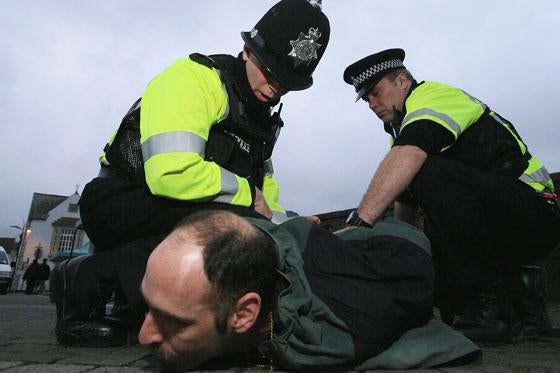
An industry backlash against police treatment of photographers picked up the pace this week as a delegation of photographers led by Labour MP Austin Mitchell sought to lobby the Government over the issue.
The MP for Grimsby has already tabled an Early Day Motion at the Commons which has been signed by 131 MPs, giving it wide cross-party support.
Photographers have complained that the police either do not understand or ignore the rules of engagement at public events.
Most recently, the Metropolitan Police have been accused of over-zealous media restrictions at the Olympic torch run in London on 6 April.
One photographer described how following the procession he was forcibly removed from the road by a police officer on horseback.
Photojournalist Theodore Liasi said he was attempting to cross the road to get pictures of supporters when a mounted policeman banged into another photographer before ‘barging’at him with the horse. The policeman also took Liasi’s picture on a mobile phone.
The accredited photographer described the situation as ‘unacceptable”. He said: ‘The police had lost control in Whitehall. The restrictions on the press were over-zealous to say the least.”
Commander Bob Broadhurst, in charge of the policing operation on 6 April, said that the Met had to clear the Olympic torch route in the face of ‘concerted’efforts to disrupt it. He said: ‘Unfortunately, this may have conflicted with what some of the media were attempting to do and I am sorry some may feel unfairly treated, but this is the fine balance that our officers must keep in a fast-moving situation where they are trying to protect the public’s safety.”
The National Union of Journalists was due to meet on Thursday with the Met to discuss the handling of the event.
Last year, a set of guidelines on dealing with the media was agreed between the NUJ and the Association of Chief Police Officers, an extension of guidelines already agreed with the Metropolitan Police. However, the union said that cases have continued to surface of police officers taking action that is not within their legal powers.
UK freelance organiser for the NUJ John Toner said the union was getting complaints about police conduct involving photographers at almost every public demonstration.
He said that complaints ranged from photographers being prevented from taking pictures to stop-and-search actions.
In 2006, photojournalist Marc Vallee received an apology and an out-of-court settlement from the Met after being injured during a ‘Sack Parliament’demonstration. In May last year, Thames Valley police rescinded a caution given to MK News photographer Andy Handley after he refused to hand over a memory card with pictures from a crash scene, taken on a public road outside of police tape.
Email pged@pressgazette.co.uk to point out mistakes, provide story tips or send in a letter for publication on our "Letters Page" blog

